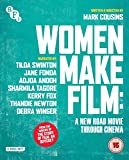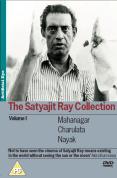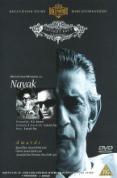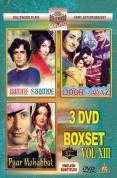![The Apu Trilogy (Criterion Collection) UK Only [Blu-ray] [2020]](/pictures/1151358.jpg) The Apu Trilogy (Criterion Collection) UK Only | Blu Ray | (25/05/2020)
from £31.98
| Saving you £N/A (N/A%)
| RRP
The Apu Trilogy (Criterion Collection) UK Only | Blu Ray | (25/05/2020)
from £31.98
| Saving you £N/A (N/A%)
| RRP Two decades after its original negatives were burned in a fire, Satyajit Ray's breathtaking milestone of world cinema rises from the ashes in a meticulously reconstructed new restoration. The Apu Trilogy brought India into the golden age of international art-house film, following one indelible character, a free-spirited child in rural Bengal who matures into an adolescent urban student and finally a sensitive man of the world. These delicate masterworks- Pather Panchali (Song of the Little Road), Aparajito (The Unvanquished), and Apur Sansar (The World of Apu)-based on two books by Bibhutibhusan Banerjee, were shot over the course of five years, and each stands on its own as a tender, visually radiant journey. They are among the most achingly beautiful, richly humane movies ever made-essential works for any film lover. Pather Panchali The release in 1955 of Satyajit Ray's debut, Pather Panchali, introduced to the world an eloquent and important new cinematic voice. A depiction of rural Bengali life in a style inspired by Italian neorealism, this naturalistic but poetic evocation of a number of years in the life of a family introduces us to both little Apu and, just as essentially, the women who will help shape him: his independent older sister, Durga; his harried mother, Sarbajaya, who, with her husband away, must hold the family together; and his kindly and mischievous elderly auntie, Indir-vivid, multifaceted characters all. With resplendent photography informed by its young protagonist's perpetual sense of discovery, the Cannes-awarded Pather Panchali is an immersive cinematic experience and a film of elemental power. Aparajito Satyajit Ray had not planned to make a sequel to Pather Panchali, but after the film's international success, he decided to continue Apu's narrative. Aparajito picks up where the first film leaves off, with Apu and his family having moved away from the country to live in the bustling holy city of Varanasi (then known as Benares). As Apu progresses from wide-eyed child to intellectually curious teenager, eventually studying in Kolkata, we witness his academic and moral education, as well as the growing complexity of his relationship with his mother. This tenderly expressive, often heart-wrenching film, which won three top prizes at the Venice Film Festival, including the Golden Lion, not only extends but also spiritually deepens the tale of Apu. Apur Sansar By the time Apur Sansar was released, Satyajit Ray had directed not only the first two Apu films but also the masterpiece The Music Room, and was well on his way to becoming a legend. This extraordinary final chapter brings our protagonist's journey full circle. Apu is now in his early twenties, out of college, and hoping to live as a writer. Alongside his professional ambitions, the film charts his romantic awakening, which occurs as the result of a most unlikely turn of events, and his eventual, fraught fatherhood. Featuring soon to be Ray regulars Soumitra Chatterjee and Sharmila Tagore in star-making performances, and demonstrating Ray's ever more impressive skills as a crafter of pure cinematic imagery, Apur Sansar is a moving conclusion to this monumental trilogy. Special Features: New 4K digital restorations of all three films, undertaken in collaboration with the Academy Film Archive at the Academy of Motion Picture Arts and Sciences and L'Immagine Ritrovata, with uncompressed monaural soundtracks on the Blu-rays Audio recordings from 1958 of director Satyajit Ray reading his essay A Long Time on the Little Road and in conversation with film historian Gideon Bachmann New interviews with actors Soumitra Chatterjee, Shampa Srivastava, and Sharmila Tagore; camera assistant Soumendu Roy; and film writer Ujjal Chakraborty New video essay by Ray biographer Andrew Robinson on the trilogy's evolution and production The Apu Trilogy : A Closer Look, a new program featuring filmmaker, producer, and teacher Mamoun Hassan Excerpts from the 2003 documentary The Song of the Little Road, featuring composer Ravi Shankar The Creative Person: Satyajit Ray, a 1967 half-hour documentary by James Beveridge, featuring interviews with Ray, several of his actors, members of his creative team, and film critic Chidananda Das Gupta Footage of Ray receiving an honorary Oscar in 1992 New program on the restorations by filmmaker :: kogonada New English subtitle translations PLUS: A booklet featuring essays by critics Terrence Rafferty and Girish Shambu
![Company Limited [DVD] [1991]](/pictures/1105671.jpg) Company Limited | DVD | (10/11/2009)
from £11.59
| Saving you £1.40 (12.08%)
| RRP
Company Limited | DVD | (10/11/2009)
from £11.59
| Saving you £1.40 (12.08%)
| RRP Shyamalendu (Barun Chanda) is a successful executive at a fan company where he is expecting a promotion shortly. His life revolves around his work and socialising with colleagues along with his wife Dolan (Paromita Chaudhuri). His sister-in-law Tutul (Sharmila Tagore) comes to stay with them for a few days. She is given a tour of the life they lead - in restaurants beauty parlours clubs and race courses. But then crisis strikes in the form of agitation at the factory just before the shipment of a prestigious export order and Shyamalendu is held to blame. With the help of a shady labour officer Shyamalendu averts the crisis by declaring a lock-out at the factory after staging a false riot. For his 'efficient' handling of the crisis Shyamalendu is promoted and there is congratulations all around - except from Tutul who has understood the vacuousness of Shyamalendu's world and has hated it. Shyamalendu is left successful and desolate - at the top.
![Devi (1960) (AKA The Goddess) (Criterion Collection) UK Only [Blu-ray] [2021]](/pictures/1156515.jpg) Devi (1960) (AKA The Goddess) (Criterion Collection) UK Only | Blu Ray | (22/11/2021)
from £19.98
| Saving you £N/A (N/A%)
| RRP
Devi (1960) (AKA The Goddess) (Criterion Collection) UK Only | Blu Ray | (22/11/2021)
from £19.98
| Saving you £N/A (N/A%)
| RRP Master filmmaker Satyajit Ray (The Apu Trilogy) explores the conflict between fanaticism and free will in Devi (The Goddess), issuing a subversively modern challenge to religious orthodoxy and patriarchal power structures. In the waning days of mid-nineteenth-century India's feudal system, after his son (Apur Sansar's Soumitra Chatterjee) leaves for Kolkata to complete his studies, a wealthy rural landowner (The Music Room's Chhabi Biswas) is seized by the notion that his beloved daughter-in-law (The Hero's hauntingly sad-eyed Sharmila Tagore) is the reincarnation of the goddess Kalia delusion that proves devastating to the young woman and those around her. The opulently stylized compositions and the chiaroscuro lighting by cinematographer Subrata Mitra (Charulata) heighten the entrancing expressionistic intensity of this domestic tragedy, making for an experience that is both sublime and shattering. Bonus Features 4K digital restoration, with uncompressed monaural soundtrack Interviews with actors Sharmila Tagore and Soumitra Chatterjee, recorded in 2013 Video essay by film scholar Meheli Sen English subtitle translation PLUS: An essay by film critic Devika Girish
![Mississippi Masala (1991) (Criterion Collection) UK Only [Blu-ray]](/pictures/1161287.jpg) Mississippi Masala (1991) (Criterion Collection) UK Only | Blu Ray | (12/12/2022)
from £26.55
| Saving you £N/A (N/A%)
| RRP
Mississippi Masala (1991) (Criterion Collection) UK Only | Blu Ray | (12/12/2022)
from £26.55
| Saving you £N/A (N/A%)
| RRP The vibrant cultures of India, Uganda, and the American South come together in Mississippi Masala by MIRA NAIR (Monsoon Wedding), a luminous look at the complexities of love in the modern melting pot. Years after her Indian family was forced to flee their home in Uganda by the dictatorship of Idi Amin, twentysomething Mina (Homeland's SARITA CHOUDHURY) spends her days cleaning rooms in an Indian-run motel in Mississippi. When she falls for the charming Black carpet cleaner Demetrius (The Tragedy of Macbeth's DENZEL WASHINGTON), their passionate romance challenges the prejudices of both of their families and exposes the rifts between the region's Indian and African American communities. Tackling thorny issues of racism, colourism, culture clash, and displacement with bighearted humour and keen insight, Nair serves up a sweet, sexy, and deeply satisfying celebration of love's power. Product Features New 4K digital restoration, supervised by director Mira Nair and director of photography Ed Lachman, with 2.0 surround DTS-HD Master Audio soundtrack on the Blu-ray New audio commentary featuring Nair New conversation between actor Sarita Choudhury and film critic Devika Girish New interviews with Lachman, screenwriter Sooni Taraporevala, and production designer and photographer Mitch Epstein English subtitles for the deaf and hard of hearing
 Women Make Film: A New Road Movie Through Cinema (Blu-ray) | Blu Ray | (18/05/2020)
from £41.98
| Saving you £N/A (N/A%)
| RRP
Women Make Film: A New Road Movie Through Cinema (Blu-ray) | Blu Ray | (18/05/2020)
from £41.98
| Saving you £N/A (N/A%)
| RRP From filmmaker Mark Cousins (Story of Film: An Odyssey) comes his epic new documentary, Women Make Film: A New Road Movie Through Cinema. Presented as a guide on how to make a film, it's presented in thematic chapters, using examples from 183 women filmmakers from around the world. Includes narration from Tilda Swinton, Debra Winger, Sharmila Tagore, and Jane Fonda. This 5disc set includes the full 14 hour version, divided into five separate parts and represents one of the most ambitious and indepth documentaries ever made.
![Five Films by Satyajit Ray (5 Disc Set) [Blu-ray]](/pictures/1127029.jpg) Five Films by Satyajit Ray (5 Disc Set) | Blu Ray | (14/04/2014)
from £N/A
| Saving you £N/A (N/A%)
| RRP
Five Films by Satyajit Ray (5 Disc Set) | Blu Ray | (14/04/2014)
from £N/A
| Saving you £N/A (N/A%)
| RRP Satyajit Ray is internationally acknowledged as one of the great masters of world cinema, with an artistic legacy that ranks as one of the most formidable in all of film history. Exceptionally versatile, his films covered almost every conceivable genre, winning him nearly every major cinema award including an Oscar for lifetime achievement as well as legions of admirers, among them Akira Kurosawa, Henri Cartier-Bresson, V.S. Naipaul and Martin Scorsese. Meticulously restored from the original negatives and presented in high-definition for the first time in the UK, this collection serves as a fitting tribute to one of cinema's most important figures.
![Devi Goddess [DVD]](/pictures/1097090.jpg) Devi Goddess | DVD | (14/09/2009)
from £3.07
| Saving you £8.18 (451.93%)
| RRP
Devi Goddess | DVD | (14/09/2009)
from £3.07
| Saving you £8.18 (451.93%)
| RRP In Goddess (aka: Devi) Doyamoyee is left alone with her husband's ageing father-in-law a devoted follower of the goddess Kali. One evening the aging widower she cares for has a dream that she is an avatar of Kali and must be worshipped. Word spreads and others come to believe that she is an incarnation of the deity. Hearing this alarming news her husband Umprasad returns only to find Doyamoyee herself beginning to believe that she is an avatar; a belief which soon turns to tragedy.
 Satyajit Ray Collection Vol.1 | DVD | (25/08/2008)
from £N/A
| Saving you £N/A (N/A%)
| RRP
Satyajit Ray Collection Vol.1 | DVD | (25/08/2008)
from £N/A
| Saving you £N/A (N/A%)
| RRP Satyajit Ray is internationally acknowledged as one of the great masters of world cinema. His films - many of them masterpieces - have won him legions of admirers among them Akira Kurosawa Henri Cartier-Bresson V.S. Naipaul and Martin Scorsese. This box set features the following films: Mahanagar (Aka: The Big City) (1963): Set in the mid '50s Ray's often humorous story of conflicting social values in India's lower-middle class stars Madhabi Mukherjee as a housewife whose growing independence alarms her traditionalist India 1963 family. Charulata (Aka: The Lonely Wife) (1964): Neglected by her ambitious journalist husband the lonely Charulata (Madhabi Mukherjee) befriends his cousin (Soumitra Chatterjee) a sensitive aspiring writer and almost inevitably their feelings for each other begin to deepen. Adapted from a story by Rabindranath Tagore Ray considered this sesnitively realised drama one of his finest achievements. Nayak (Aka: The Hero) (1966): This beautifully observed character study was one of Ray's earliest original screenplays. En route to an award ceremony a famous and egocentric Bengali movie star finds that he is compelled to re-evaluate his life after encountering a disapproving young journalist (Sharmila Tagore).
 Viruddh | DVD | (01/10/2007)
from £N/A
| Saving you £N/A (N/A%)
| RRP
Viruddh | DVD | (01/10/2007)
from £N/A
| Saving you £N/A (N/A%)
| RRP They pushed him too far...Now bear the consequences. An ageing couple are forced to search for their faith in human values and society after the death of their only son Amar. In the process they undergo the most testing struggle of their lives.
 Nayak | DVD | (07/08/2006)
from £N/A
| Saving you £N/A (N/A%)
| RRP
Nayak | DVD | (07/08/2006)
from £N/A
| Saving you £N/A (N/A%)
| RRP Arindam Mukherjee a famous film star is on his way to Delhi to receive an award. The film reveals his not so good mood for his latest flop film & the over published news of his involvement in a club brawl. While travelling Arindam meets an interesting cross-section of his fans. A young attractive editor of a woman's magazine Aditi takes the interview of Arindam not biased by any fanship but rather to make a good saleable copy of it. Later on in the film we come across Arindam's terrifying dream. Though he refused Aditi in the beginning he eventually opens up before her and she realizes the warm and lonely man in him. Out of respect for his frank confession she tears off the sheets of the interview.
 Mausam | DVD | (03/03/2008)
from £14.98
| Saving you £-8.99 (-150.10%)
| RRP
Mausam | DVD | (03/03/2008)
from £14.98
| Saving you £-8.99 (-150.10%)
| RRP Mausam involves a young medical student who falls for the daughter of a heeler after seeking his help with an injured leg.
 Aradhana | DVD | (30/10/2006)
from £8.08
| Saving you £-2.09 (-34.90%)
| RRP
Aradhana | DVD | (30/10/2006)
from £8.08
| Saving you £-2.09 (-34.90%)
| RRP Aradhana
![Amar Prem [DVD]](/pictures/1122286.jpg) Amar Prem | DVD | (29/07/2013)
from £16.18
| Saving you £-3.19 (N/A%)
| RRP
Amar Prem | DVD | (29/07/2013)
from £16.18
| Saving you £-3.19 (N/A%)
| RRP DVD
 An Evening In Paris | DVD | (05/01/2004)
from £N/A
| Saving you £N/A (N/A%)
| RRP
An Evening In Paris | DVD | (05/01/2004)
from £N/A
| Saving you £N/A (N/A%)
| RRP Deepa has always been unlucky in matters of the heart. Her bitter experiences have made her believe that Indian men are only interested in her wealth. So she decides to go to Paris the most romantic city in the world in search of true love. Soon after reaching Paris Deepa realizes the Frenchmen are born flirts Shyam an Indian approaches Deepa in the guise of a Frenchman and gets rejected because of her perception of them. To see if Shyam gets Deepa watch 'An Evening In Paris'.
![The Hero [Blu-ray]](/pictures/1123512.jpg) The Hero | Blu Ray | (09/09/2013)
from £34.99
| Saving you £-15.00 (N/A%)
| RRP
The Hero | Blu Ray | (09/09/2013)
from £34.99
| Saving you £-15.00 (N/A%)
| RRP This beautifully observed character study was one of Ray's earliest original screenplays. En route to an award ceremony a famous and egocentric Bengali movie star finds that he is compelled to re-evaluate his life after encountering a disapproving young journalist.
![Waqt [1965]](/pictures/1006291.jpg) Waqt | DVD | (07/05/2001)
from £N/A
| Saving you £N/A (N/A%)
| RRP
Waqt | DVD | (07/05/2001)
from £N/A
| Saving you £N/A (N/A%)
| RRP Waqt ("Time") is a serious candidate for inclusion in any list of great Hindi movies. An early example of a "multi-starrer", it has four top heroes and two great heroines. Its melodramatic plot, based on a lost and found theme of a family separated by an earthquake in pre-partition Punjab and reunited later in Mumbai (Bombay), takes the viewer through a whole range of emotions. It set a whole new look for Hindi films, with a glamorous lifestyle that featured American cars, houses with sunken seating areas, red velvet carpets, grand pianos and lavish parties. Its songs are still much played today, especially "Ae mere zohrajabeen" ("My Beauty") and "Aage bhi jaane na tum" ("You Don't Know What Lies Ahead"). This was the first colour film made by BR Films and established Yash Chopra as a major filmmaker, a position he still holds some 40 years later. On the DVD:Waqt on DVD has good sound and picture quality and the eight songs can all be accessed separately from the menu. The subtitles are adequate and are given for both dialogue and songs. There's a theatrical trailer and an interview with Karan Johar (Kuch kuch hota hai, Kabhi khushi kabhie gham), one of the new generation of directors inspired by Yash Chopra. --Anika Puri
![Daag [1977]](/pictures/1006377.jpg) Daag | DVD | (10/07/2000)
from £N/A
| Saving you £N/A (N/A%)
| RRP
Daag | DVD | (10/07/2000)
from £N/A
| Saving you £N/A (N/A%)
| RRP Wrongly convicted of murder and on the run from the law Sunil is forced to leave behind his new bride Sonia when he kills her would-be rapist. A chain of events follow to make things even worse for the newly weds...
 Kashmir Ki Kali | DVD | (05/01/2004)
from £N/A
| Saving you £N/A (N/A%)
| RRP
Kashmir Ki Kali | DVD | (05/01/2004)
from £N/A
| Saving you £N/A (N/A%)
| RRP Rajib sole heir to a millionaire industrialist is often chided by his mother for his somewhat eratic behavior. On one such an occasion he goes out of the way to announce an award of five lakhs to his mill workers an act which is very distressing to his mother and her manager Shyamlal. Shyamlal suggests that they should try and find a suitable bride for the boisterous young man as he would surely settle down after marriage. Marriage however is not something which fits into Rajib
![Waqt [DVD]](/pictures/1131342.jpg) Waqt | DVD | (28/12/2010)
from £N/A
| Saving you £N/A (N/A%)
| RRP
Waqt | DVD | (28/12/2010)
from £N/A
| Saving you £N/A (N/A%)
| RRP Waqt ("Time") is a serious candidate for inclusion in any list of great Hindi movies. An early example of a "multi-starrer", it has four top heroes and two great heroines. Its melodramatic plot, based on a lost and found theme of a family separated by an earthquake in pre-partition Punjab and reunited later in Mumbai (Bombay), takes the viewer through a whole range of emotions. It set a whole new look for Hindi films, with a glamorous lifestyle that featured American cars, houses with sunken seating areas, red velvet carpets, grand pianos and lavish parties. Its songs are still much played today, especially "Ae mere zohrajabeen" ("My Beauty") and "Aage bhi jaane na tum" ("You Don't Know What Lies Ahead"). This was the first colour film made by BR Films and established Yash Chopra as a major filmmaker, a position he still holds some 40 years later. On the DVD:Waqt on DVD has good sound and picture quality and the eight songs can all be accessed separately from the menu. The subtitles are adequate and are given for both dialogue and songs. There's a theatrical trailer and an interview with Karan Johar (Kuch kuch hota hai, Kabhi khushi kabhie gham), one of the new generation of directors inspired by Yash Chopra. --Anika Puri
 Bollywood Classics Vol.13 | DVD | (01/10/2007)
from £N/A
| Saving you £N/A (N/A%)
| RRP
Bollywood Classics Vol.13 | DVD | (01/10/2007)
from £N/A
| Saving you £N/A (N/A%)
| RRP This box set includes: Aamne-Saamne: (Dir.Suraj Prakash) (1967): Shashi Kapoor is accused of murdering his wife however due to lack of evidence he is found not guilty. Shashi Kapoor meets and falls in love with a woman living across from him. Door Ki Awaz (Dir. Devendra Goel) (1964): When Prakash goes to drop his sister at the railway station he meets Jyoti... Pyar Mohabbat: (Dir. Shankar Mukherjee) (1966): After running away from home Prince Naresh Kumar Singh (Dev Anand) now calls himself Dilip Singh returns home after a period of 18 years. He meets Reeta Singh (Saira Banu) and after a series of misunderstandings both fall in love with each other. When Dilip reaches Devangarh he is shocked to find that his brother is dead.

Please wait. Loading...
This site uses cookies.
More details in our privacy policy